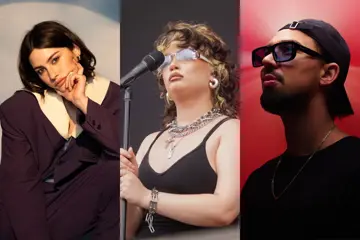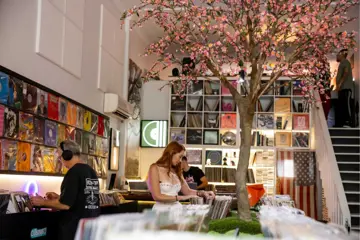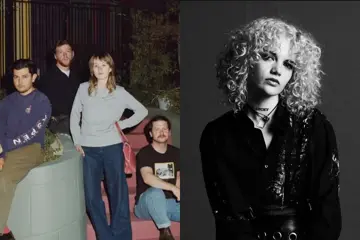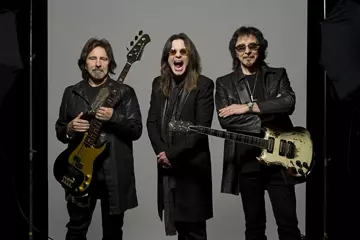Youth music conference Feedback is gearing up to rain advice down on eager people wanting to learn more about the music industry and we figured we'd give you all a taster of what to expect with some golden gems from some of Australia's music biz best.
Five industry figures speaking on the day (as part of Vivid Sydney), including future soul queen Ngaiire, PR extraordinaire Monique Rothstein, I OH YOU label head Johann Ponniah and more shared some of the questions they wish they'd asked before diving into the world of music, gigs and everything in between.
Feedback takes place on 12 June at the Museum of Contemporary Art — get around tickets here.
Monique Rothstein / Positive Feedback
1. Is it going to be tough? I wish I had known the real challenges of starting your own company — nobody talks about the personal sacrifices you make in order to run your own shop.
2. Are there are rules? It turns out that there are no rules! You can do anything the way you choose to (as long as it is authentic and true to you and your artist) and there truly is no model for success.
3. What is the best way to learn? Being proactive is key to developing, upskilling and better understanding the local and international music market. Go to as many networking events as you can, ask for help, ask questions and perhaps consider finding yourself a mentor. Everyone is busy but we’re actually part of a very supportive community if you tap into it.
4. How will I support myself financially? I wish I had known how long it would take to have a financially sustainable business in this industry. It often requires working several jobs and supplementing your income with other work. If you don’t make the time to do some considered forward planning, cash projections and a business plan, it can cause considerable challenges in the long run. Being broke sucks and has its own set of stresses.
5. Success happens overnight, right? Hell no! Slow and steady wins the race, friends. Be patient, gentle with yourself, compassionate, authentic and true to you/your artists vision. A career in this industry needs to be sustainable, so the quicker the rise, the less likely it is going to be to sustain it. Pace yourself, make time to do things that bring you joy outside of work, meditate to stay calm and drink lots of water between your beers.
Johann Ponniah / I OH YOU
I don’t think I have a top 5 questions I wish I had asked, more just the one (which I eventually did ask) which is: “Can I come into the office and intern/help out?”
Ngaiire / artist
1. I wish there was more emphasis on how to keep your financial books in order. All the music conferences/workshops I attended always seemed to ignore the fact that a lot of artists are hopeless when it comes to keeping all your finances in order.
2. How royalties work, i.e. mechanicals, songwriting etc.
3. How songwriting points work.
4. Is triple j really the be all end all?
5. What is more important — having a manager, publicist or a booking agent first?
Andy Gumley / Village Sounds
“In hindsight If I could go back I would be asking from day one not only about learning my role as an agent but asking to learn about every member of an artist's team and what their role entails. Something that you come to learn is how every part of an artist's team feeds into the next and quite often the tricky task of a manager is to keep everyone across the big picture, what the label is doing, the publicist, the agent and how they can each support the other's plans.
"So many times it can be the combination of two things working in conjunction, like a commercial sync coupled with a well timed headline show or the combination of a big international support and the right PR surrounding it that can completely change the perception of an artist. That would be it, I’d be asking as much as I could about every role in the team as early as I could because it’s all really helpful.”
Hannah Crofts / MusicNSW & All Our Exes Live In Texas
1. Do you think it’s important/vital/necessary to study Music Performance or Music Industry? I ask because I studied Jazz Improvisation at Uni because my high school told me you had to go to Uni – in retrospect I wish someone had told me to dive into interning and just starting a band and jamming with mates. Interning and playing music in a supportive environment was way more valuable than the HECS debt I’m now paying off. Not to say Uni isn’t ace for some people – I just think showing all path options is important to highlight.
2. I’m not writing/performing music that triple j will be likely to play – outside of radio play, how can I build my network/Australian musical career? I think most Australian bands don’t get supported by triple j but stress about it/plan their career around it to be the starting goal. If you get triple j support GREAT, if you don’t then what’s your plan?
3. Do you make all your income off music? If you do, how do you do it? If you don’t, what else do you do? What did you get paid for your first gig? What do you get paid now? Most musicians who talk on MusicNSW panels talk about how they wish they had set themselves up financially from the beginning of their careers (even from very early days) – going to an accountant, keeping track of your books, doing your tax etc. It’ so hard to earn a living off music, so how do people do it? How are people paying their rent and how can you be smart about your financial future?
4. How important is co-writing? How did you learn how to do it? How did you find people to collaborate/co-write with? I think co-writing is a scary thing that sometimes seems too big an idea to know how to begin – how do you get into a room with a stranger and then spend four hours writing a song together? How do you both have ideas and work them together? Why is this an important skill to learn?
5. How do streaming services work and how can I use them to my advantage? As someone who works in the industry I’m really bored of the conversation being ‘Streaming services are bad and artists don’t make any money’ – I think the conversation should be how can we put more pressure on streaming services to be more transparent/how can streaming my music help my music career/how do streaming services actually work/how can we educate our audience to pay for music even via streaming? Be smart and learn how to use streaming as a tool to help your career.















